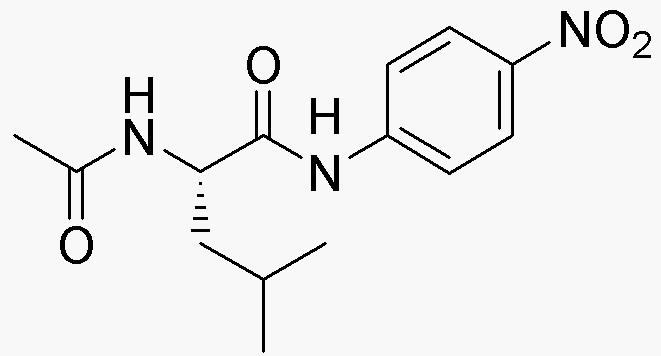Acetyl-L-leucine 4-nitroanilide is widely utilized in research focused on:
- Biochemical Research: This compound serves as a substrate in enzyme assays, allowing researchers to study enzyme kinetics and mechanisms, particularly in proteolytic enzymes.
- Pharmaceutical Development: It is used in drug formulation studies, helping scientists evaluate the bioavailability and efficacy of new therapeutic agents.
- Analytical Chemistry: The compound acts as a reagent in various analytical techniques, including chromatography and mass spectrometry, aiding in the identification and quantification of biomolecules.
- Protein Synthesis Studies: Acetyl-L-leucine 4-nitroanilide is employed in studies related to protein synthesis, providing insights into amino acid incorporation and peptide bond formation.
- Education and Training: It is often used in academic laboratories for teaching purposes, helping students understand organic synthesis and biochemical analysis techniques.
General Information
Properties
Safety and Regulations
Applications
Acetyl-L-leucine 4-nitroanilide is widely utilized in research focused on:
- Biochemical Research: This compound serves as a substrate in enzyme assays, allowing researchers to study enzyme kinetics and mechanisms, particularly in proteolytic enzymes.
- Pharmaceutical Development: It is used in drug formulation studies, helping scientists evaluate the bioavailability and efficacy of new therapeutic agents.
- Analytical Chemistry: The compound acts as a reagent in various analytical techniques, including chromatography and mass spectrometry, aiding in the identification and quantification of biomolecules.
- Protein Synthesis Studies: Acetyl-L-leucine 4-nitroanilide is employed in studies related to protein synthesis, providing insights into amino acid incorporation and peptide bond formation.
- Education and Training: It is often used in academic laboratories for teaching purposes, helping students understand organic synthesis and biochemical analysis techniques.
Documents
Safety Data Sheets (SDS)
The SDS provides comprehensive safety information on handling, storage, and disposal of the product.
Product Specification (PS)
The PS provides a comprehensive breakdown of the product’s properties, including chemical composition, physical state, purity, and storage requirements. It also details acceptable quality ranges and the product's intended applications.
Certificates of Analysis (COA)
Search for Certificates of Analysis (COA) by entering the products Lot Number. Lot and Batch Numbers can be found on a product’s label following the words ‘Lot’ or ‘Batch’.
Numéro de catalogue
Numéro de lot/série
Certificates Of Origin (COO)
This COO confirms the country where the product was manufactured, and also details the materials and components used in it and whether it is derived from natural, synthetic, or other specific sources. This certificate may be required for customs, trade, and regulatory compliance.
Numéro de catalogue
Numéro de lot/série
Safety Data Sheets (SDS)
The SDS provides comprehensive safety information on handling, storage, and disposal of the product.
DownloadProduct Specification (PS)
The PS provides a comprehensive breakdown of the product’s properties, including chemical composition, physical state, purity, and storage requirements. It also details acceptable quality ranges and the product's intended applications.
DownloadCertificates of Analysis (COA)
Search for Certificates of Analysis (COA) by entering the products Lot Number. Lot and Batch Numbers can be found on a product’s label following the words ‘Lot’ or ‘Batch’.
Numéro de catalogue
Numéro de lot/série
Certificates Of Origin (COO)
This COO confirms the country where the product was manufactured, and also details the materials and components used in it and whether it is derived from natural, synthetic, or other specific sources. This certificate may be required for customs, trade, and regulatory compliance.


